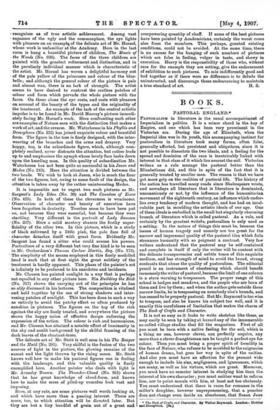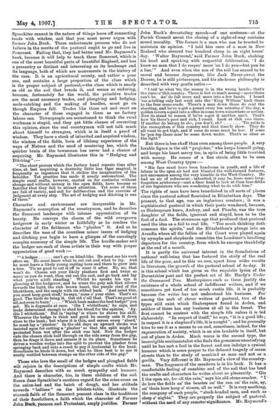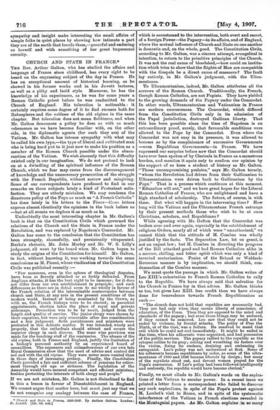BOOKS.
PASTORAL ENGLAND.*
PASTORALISM in literature is the usual accompaniment of Imperialism in politics. It is a minor chord in the key of Empire, and one which has been very prominent in the Victorian era. During the age of Elizabeth, when the Imperial idea was in its youth, this accompanying instinct for pastoralism in literature took many forms, often false; generally affected, but persistent and ubiquitous, since it is not possible to dissociate the two ideals, and a feeling for the spread and dominion of the race is inextricably linked with interest in that class of it which lies nearest the soil. Victorian writers as a rule manage the pastoral better than the Elizabethans did, and this in spite of the fact that it is generally treated by smaller men. The reason is that we have got more grip on the realities of pastoral life. The history of the nation has travelled many roads since Shakespeare wrote, and nowadays all literature that is literature is dominated, unconsciously or not, by the influence of the humanitarian movement of the eighteenth century, an influence which under- lies every tendency of modern thought, and has had an incal- culable part in moulding the artistic ideals of our age. One of these ideals is embodied in the small but singularly charming branch of literature which is called pastoral. As a rule, and certainly by the greatest writers, pastoralism is only used as a setting. In the nature of things this must be, because the issues of human tragedy and comedy are too great for the narrow and impersonal quality of the pastoral idea which foils strenuous humanity with so poignant a contrast. Very few writers understand that the pastoral may be self-contained and complete in itself if only the writer will be content with the delicate transparencies and subtle tones of this exquisite medium, and has strength of mind to avoid the broad, strong contrasts that abuse the quality of pastoralism. The editorial pencil is an instrument of chastening which should benefit immensely the writer of pastoral, because the limit of one column is a stern warning to trespassers. The proper range of this school is hedges and meadows, and the people who are born of them and live by them; and when the author gets outside these narrow limits, he is trespassing on somebody else's bounds, and has ceased to be properly pastoral. But Mr. Raymond is too wise to trespass, and also he knows his subject too well, and it is exactly this carefulness of limitation that makes the charm of The Book of Crafts and Character.
It is not so easy as it looks to write sketches like these, as may easily be seen by taking at hazard any of the innumerable so-called village studies that fill the magazines. First of all you must be born with a native feeling for the soil, which is a thing no one, however clever, can perfectly acquire, any more than a clever draughtsman can be taught a perfect eye for colour. Then you must bring a proper spirit of humility in the face of Nature, who refuses to be moulded to the exigencies of human drama, but goes her way in spite of the unities. And also you must have an affection for the peasant wide enough to include his sins, negligences, and ignorances, which are many, as well as his virtues, which are great. Moreover, you must have no remoter interest in studying him than the interest of his own character ; you must neither want to reform him, nor to point morals with him, at least not too Obviously. You must understand that there is room for romance in the miller's daughter, however unprepossessing, that a poacher does not change even inside an almshouse, that Susan Jane
• The Book of emits and Character. By Walter Bvusid. London r Madder and Stoughton. Ds.] Sprackiter cannot in the nature of things leave off connecting toads with witches, and that you must never argue with farmer John Buck. Those unfortunate persons who do not believe in the merits of the pastoral ought to go and live in Somerset. Failing that, they had better read Mr. Raymond's book, because it will help to teach them Somerset, which is one of the most beautiful parts of beautiful England, and has a peasantry as distinct and interesting as its landscape and its language, both of which are monuments in the history of the race. It is an agricultural county, and rather a poor one, and contains a large proportion of the class which is the proper subject of pastoral,—the class which is nearly as old as the soil that breeds it, and seems as enduring, because, fortunately for the world, the primitive trades are the most necessary trades, and ploughing and hedging, mole-catching and the making of hurdles, must go on though Empires fall. Trades like these act and react on the character of those engaged in them as no factory labour can. Townspeople are accustomed to think the rural workman is stupid, and they get little chance of correcting this opinion, since the real countryman will not talk much about himself to strangers, which is in itself a proof of wisdom. They have a stock of inherited and acquired wisdom, the wisdom of the fields, born of lifelong experience of the ways of Nature and the need of mastering her, which the quicker brain of the townsman has never had a chance of acquiring. Mr. Raymond illustrates this in "Hedging and Ditching" :— " The short process which the factory hand repeats time after time, at last acquiring a dexterity little less than magical, is frequently so ingenious that it strikes the imagination of the beholder. Yet practice has made it nearly automatics]. The simple rural crafts, however, carried on for centuries without change and without secrecy in the open fields, have become so familiar that they fail to attract attention. Yet some of them are full of variety, and call for deliberation and the exercise of judgment at every step. The art of hedging and ditching is one of these."
Character and environment are inseparable in Mr. Raymond's conception of the countryman, and he describes the Somerset landscape with intense appreciation of its beauty. He conveys the charm of the wild overgrown hedgerow in early winter as faithfully as he renders the character of the fieldsman who " plashes " it. And as he describes the uses of the countless minor issues of hedging and ditching you begin to have a glimpse of the amazingly complex economy of the simple life. The hurdle-maker and the hedger are each of them artists in their way with proper appreciation of good work :—
"'A hedger can't go on blind-like. He must see his work
afore un. He must know what to out out and what to lay. And be must leave a likely young sapling here and there to grow into a tree. 'Tis so good to cut it off to want it after. No, no, that won't do. Choose out your likely plashers first and twice so many as you do want, then out out the rest, and go back and lay what you've a-left standing.' Whilst he speaks his eye is glancing at the hedgerow, and he scans the grey ash that silvers towards the light, the rich brown hazel, the purple rind of the blackthorn, and the maple with its ribbed bark. ' And mind this, you must keep good stuff,' he says, none o' your elder. That's no good. The birds do bring it. Get rid o' all that. That's no good at all,not even to burn.' ... Which bush makes the beat hedge?' you ask. He is dogmatic at once. Gie I whitethorn,' he says, and looks determined enough to shed his blood for the opinion. Ay. Ole I whitethorn.' But in 'laying' is where he shows his skill. Wherever the hedge is thick and good he merely cuts it down close to the bank ; but where it is thin, and across every 'shard,' be must lay a plasher.' In the old days an upward stroke was insisted upon for cutting a • plasher' so that the split might be protected from wet after the stick was laid. Now the hedger cuts the chosen stick half through on the side away from the gap, then he drags it down and secures it in its place. Sometimes he drives a wooden wedge into the split to prevent the plasher from springing back and-outs a crook to peg it horizontal to the bank. Sometimes he binds it down, but what he likes best is to see it neatly wattled between stumps on the other side of the gap."
Those who love the smell of the hedges and ploughed fields will rejoice in the descriptions of simple crafts which Mr. Raymond describes with so much sympathy and humour. And there is character, too, in these children of the soil. Susan Jane Sprackiter's cautions regard for the criss-cross on the onion-bed and the batch of dough, and her attitude towards " belliaea " on the kitchen.table, illustrate the staunch faith of the Somerset peasant class in the traditions of their forefathers, a faith which the character of Farmer John Buck, yeoman and Protestant, amply justifies. Farmer
John Buck's devastating speech—of one sentence—at the- Parish Council anent the closing of a right-of-way contains sound morality. The farmer is a man who oun be trusted to maintain in opinion. "I told him once of a man in New, Zealand who sheared two hundred sheep in an eight hours day. ' Walter Raymond,' said Farmer John Buck, shaking his bead and speaking with respectful deliberation, 'I do know no man that I do respec' more 'an I do you—but you be- a liar.'" And even when the son of the soil has ceased to be, moral and become degenerate, like Jack Never-sweat the Drover, he is still picturesque, and his ale-house philosophy is described with very gentle satire :— " I tell 'ee what 'ffis, the money is in the wrong hands ; that's the curse o' this country. There is but so much money—more there can't be. An' do fall more and more into a few hands. I heard 'em a-telling only last week into the ' King William' back there to the four cross-roads. There's a man down there do rent the shooting, and he've a-got a pound every ten minutes o' the day, a golden sovern a-paid into a office in some town somewhere or nether. Now do stand to reason if he've a-got it another can't. That's how 'tie there's poor and rich, I count. Look et thik ewe there.
If another do belong to she, you don't, eh P 'Tis pride is the roonayshun o' this country and that time'll show. They do all want to get high, and if some do some must be low. If some be 'pen top there M Ile be some down under. That's so clear as the light."
But there is less chaff than corn among these people. A very. lovable figure is the old " projieker," who keeps himself going, and keeps his heart merry too, in spite of being little troubled with money. He comes of a fine strain often to be seen among West Country types:— " His face must have been handsome in youth, and a life of labour in the open air had not blunted the well-formed features, not uncommon among the very humble in the West Country. Ho had an air of refinement—inherited, it may be, from some long- forgotten aristocracy—and a finer head to look at than four-fifths' of our legislators who are wondering what to do with him:"
The rights of man have been brandished in all sorts of places- since the pastoral school flourished in Elizabethan days. The-- peasant, to that age, was an inglorious creature ; it was a sophisticated pastoral in which their poets wandered, because, as Shakespeare knew, Audrey, and not Phoebe, was the time daughter of the fields, ignorant and stupid, born to be the fool of a fool. The strenuous age that produced that pastoral used the idea as a foil to real life. " Too much thinking cloth consume the spirita," and the Elizabethan's plunge into an Arcadia where all the follies of the Court were played again by nymphs and shepherds resembles the Londoner's headlong departure for the country, from which he emerges thankfully, at the end of a month.
It is partly the universal interest in the foundations of national well-being that has fostered the study of the real life of the poor, and to this we owe, apart from wider results in literature, the growth of the pastoral school of to-day. H- is this school which has given us the exquisite lyrics of the Dorsetshire poet and the perfect art of Mr. Hardy's Under the Greenwood Tree. Masterpieces such as these justify the existence of a whole school of indifferent writers, and if we sometimes get tired of too much rustic life, it is probably because the writer has not understood his business. For- among the mob of clever writers of pastoral, two of the types still exist which Shakespeare found in Arden, and neither of these has any business at all in the forest. The first cannot be content with the simple life unless it is led elaborately. " In respect of itself," he says, "it is a good life ; in respect it is a shepherd's life, it is naught"; and he generally tries to use it as a means to an end, sometimes, indeed, for the regeneration of society, which is an aim laudable in itself, but out of place in Arden. Much worse is the second type, the incorrigible sentimentalist who finds the greenness unsatisfying until he has met a fool in the forest and can indulge a cynical humour which is more proper to the debased tragedy of mean- streets than to the study of mankind as man and not as a... gorilla. 'Very different is Mr. Raymond's view of the country- man. The fragrance of the meadows is in his book. It has a= comfortable feeling of sunshine and of the soil that has bred the crafts and characters he writes about so pleasantly. "(hie I the open air, for all the rain," says hie old stone-cracker. "1. do love the fields an' the beastes an' the nun an' the rain, ay, an' that; here heap o' stones, all zo well." It is very soothing, the company of such people, " sleek-headed men, and such as sleep o nights." They are properly the subject of pastoral, without the need of any remoter significance. Mr. Raymond's . sympathy and insight make interesting the small affairs of simple folks in quiet places by showing how intimate a part they are of the earth that breeds them,—peaceful and enduring as herself and with something of her great Impersonal serenity.
















































 Previous page
Previous page